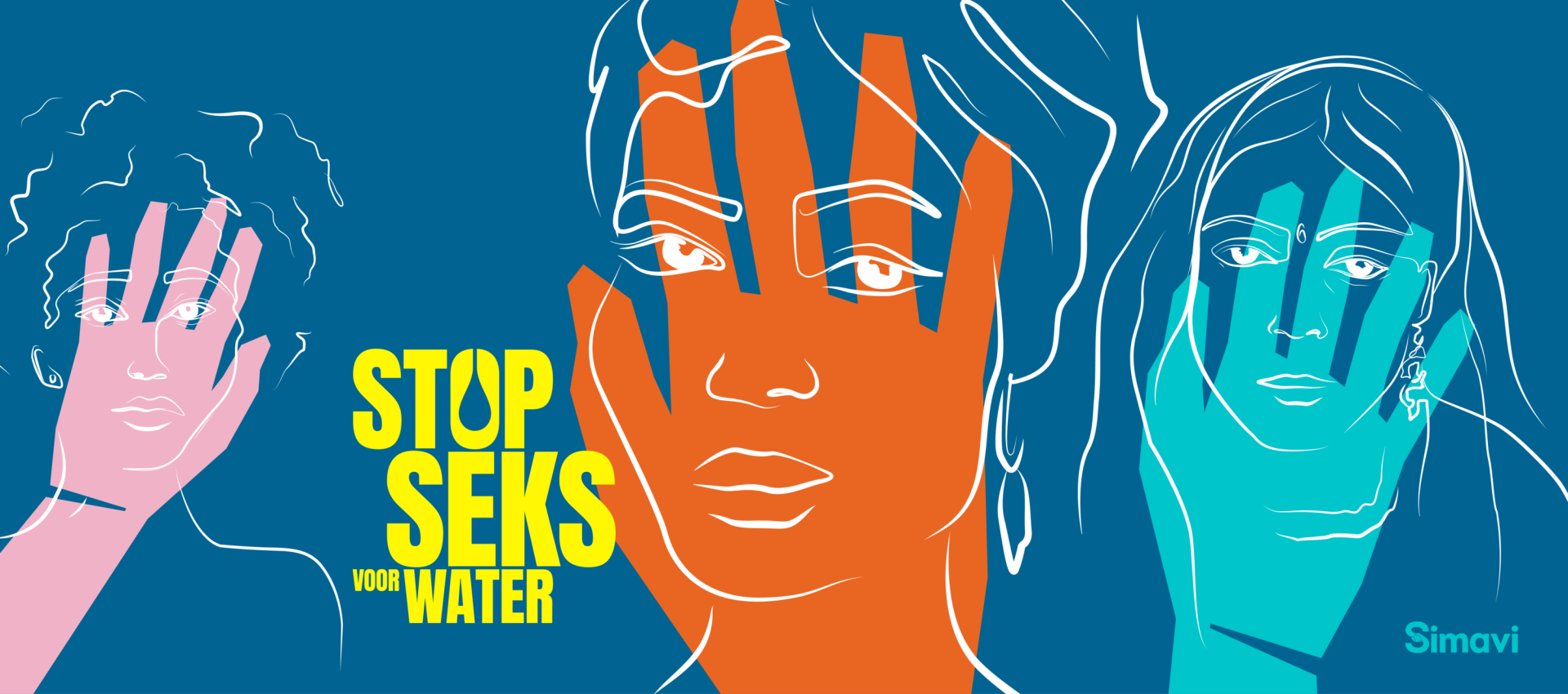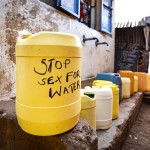Sign our petition and stop sex for water
Being extorted to have sex in exchange for drinking water. It happens, and it's unacceptable!
Due to increasing water scarcity and a lack of water supplies, women are pressured to have sex in exchange for water. Sign our petition now and join us in our fight to end sextortion.
Will you help us collect 100,000 signatures?

The consequences of water scarcity
Climate change worsens access to water: droughts, but also floods damage water sources. In the cities, women and girls therefore queue for hours for a jerry can of water and in remote areas they walk for miles in search of water for their families.
The lengthy journeys and long waiting times mean that they cannot go to school or earn an income, but it also leads to sexual extortion.
Research by Simavi shows that many women are harassed or sexually intimidated in line for water and that some women and girls are even forced to have sex with the men who manage the water points in exchange for water. Recent research by one of our partners in Bangladesh sheds more light on how vulnerabilities are exploited.

"The water vendor said to me, 'All I want from you is your body. After that, you can get water.'"
Help out and stop sex for water!
We believe that everyone, everywhere in the world should have safe access to drinking water. Rising water scarcity due to climate change hits women the hardest. Around the world, from Kenya to Bangladesh, women are trying to find solutions to this, but often find themselves with their backs against the wall.
The Dutch outgoing cabinet chose to remove all funding for climate and women's rights from the budget for development cooperation. With our petition, we want to call on all political parties in the Lower House to reverse this policy. And to ensure that we do not abandon these women and girls.
Because water is a human right and should never be used as a means of exploitation, corruption or sextortion. The Netherlands must put better access to water services, and the position of women and girls in the most climate-vulnerable communities at the top of the agenda.
We need your support. Will you sign the petition?
The facts
More than 2 billion people live in countries with water shortages, 27% of the world's population does not have access to a safe water supply.
Women and girls are responsible for fetching water in 7 out of 10 households without their own water supply.
In Bangladesh, 15 percent of women experience sexual and gender-based violence when they want to use water, shower or toilet. A third of this is a form of sextortion.
Every signature helps
Will you help us reach the 100,000 signatures mark? By doing so, we will make an urgent appeal to the Dutch government to commit to ending this terrible human rights violation. Governments must take responsibility. Only then can we stop sex for water.

'Young girls, and women who are alone, are especially vulnerable to sexual extortion.'
Action in the Netherlands
We want to collect at least 100,000 signatures to urge politicians not to abandon these women and girls. We want the Parliament to press the government to ensure that the Netherlands implements policies that focus on safe access to water and sanitation for women and girls in areas hardest hit by water scarcity due to climate change.
We want that new policies are made after the elections focusing on safe access to water and sanitation for women and girls in those areas where people are most vulnerable to water scarcity as a consequence of climate change.
'Sex for water has become normalized in my community. It's terrible what women go through here.'
Neelai from Kenya
Action worldwide
We also want action worldwide! That is why we urgently called on the UN Special Rapporteur on water and sanitation, Pedro Arrojo-Agudo, in 2024 to challenge governments on this terrible human rights violation. The Special Rapporteur has pledged his support and is keen to work with us on this issue.
We also want to draw attention to sex for water this year to the Special Rapporteur against violence against women and the Special Rapporteur on climate change in the fight against sex for water. We call on them to put this issue higher on the agenda and include it in official reports. International recognition of the problem of sex for water helps and protects development organisations and women's organisations from countries where this is an issue.
Action in the countries where we work
In addition, we stand up for the women and girls who are vulnerable to sextortion. We do this by working with various projects on safe water supplies closer to home for women and girls in Bangladesh, Kenya and Uganda. We also support organisations that are committed to combating sextortion, such as Sareen Malik of ANEW, the African umbrella organization for social organisations in the field of water.
Stop sex for water!
Let your voice be heard. Because sex for water is unacceptable.
What is sextortion?
Sextortion is a form of extortion or corruption in which people abuse their positions of power to obtain sexual services from women or girls. This could include water vendors, water point managers or government employees.
Sextortion comes in several forms, including the practice where women in parts of Africa and Asia are induced or forced to have sex to gain access to water. Sex for water is unacceptable and must stop.
Questions
Do you have questions about this petition? If so, please take a look at these frequently asked questions.


